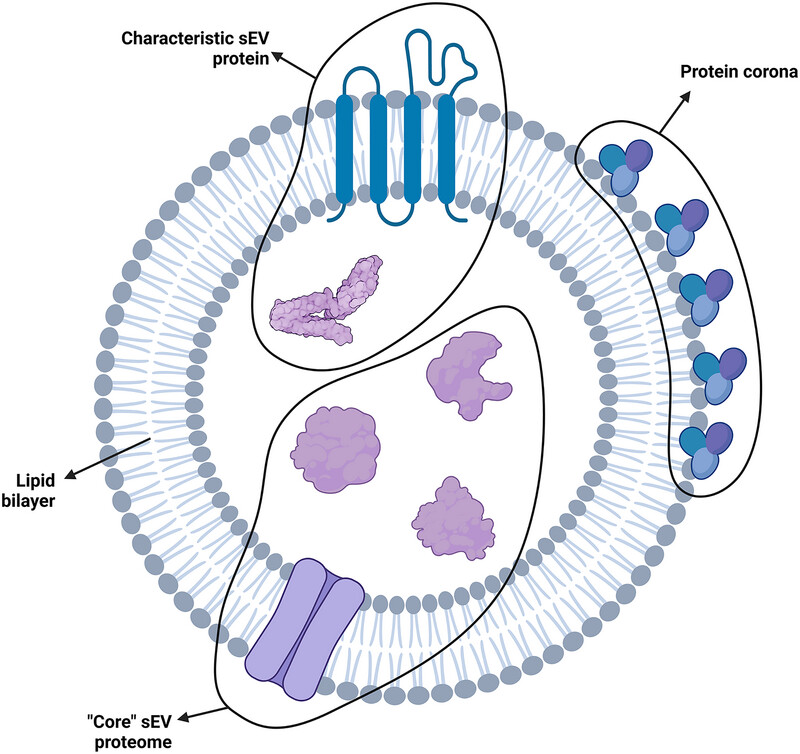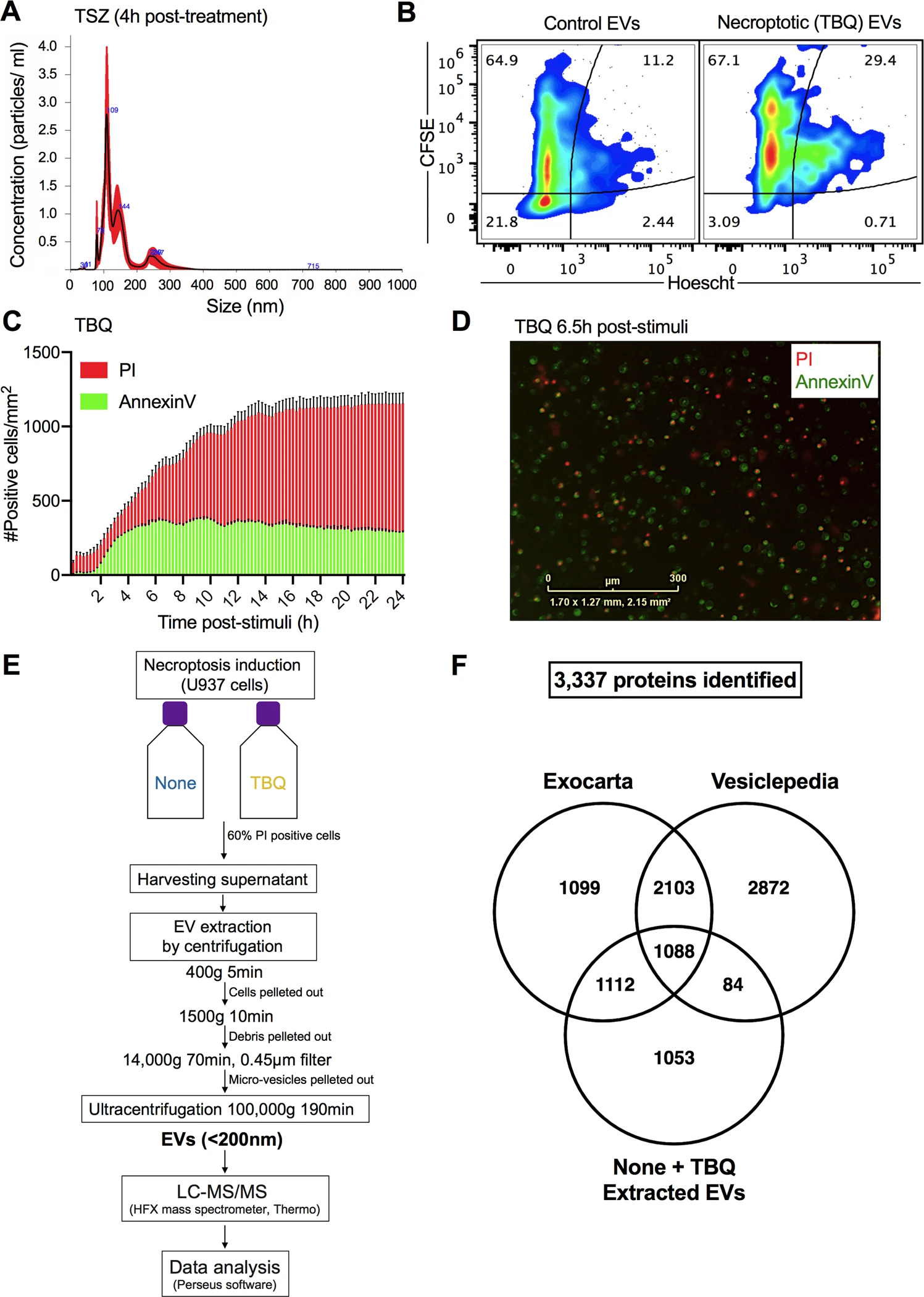Extracellular Vesicles Proteomics Service
Extracellular vesicles proteomics analysis is a high-throughput technology focused on analyzing the protein components in extracellular vesicles (EVs). Extracellular vesicles are small vesicles secreted by various cells, including microvesicles, exosomes, and apoptotic bodies. These vesicles are widely present in bodily fluids and carry various biomolecules from the cell. Through high-resolution mass spectrometry technology, this service can accurately identify and quantify proteins in the vesicles, revealing their important roles in intercellular communication, signal transduction, and material transport in biological processes.
Extracellular vesicles proteomics service is widely applied in fields such as cancer research, immunology, neurodegenerative diseases, and cardiovascular diseases. In cancer research, extracellular vesicle proteomics can reveal tumor biomarkers, providing support for early diagnosis and treatment. In immunology, analyzing the proteins within vesicles helps study immune responses and immune evasion mechanisms. In neurodegenerative diseases, the protein components of vesicles offer new insights into disease mechanisms. Through comprehensive analysis of extracellular vesicle proteomes, researchers can better understand intercellular interactions and their roles in health and disease.

Fochtman, D. et al. Journal of Extracellular Vesicles, 2024.
Figure 1. A Schematic Representation of the sEV Proteome.
Services at MtoZ Biolabs
Based on the high-resolution mass spectrometry platform, MtoZ Biolabs' extracellular vesicles proteomics service offers comprehensive analysis of proteins in extracellular vesicles. Extracellular vesicles are extracted from body fluid samples such as blood, urine, cell culture supernatant, and combined with optimized isolation and purification techniques, the high purity and integrity of the sample are ensured. The service content includes qualitative and quantitative analysis of proteins of extracellular vesicles, revealing their molecular composition and functional characteristics. Data analysis provides detailed protein identification, abundance changes, functional annotation and pathway analysis through advanced bioinformatics tools to help researchers understand the potential of extracellular vesicles in disease mechanisms, marker discovery and treatment.
Service Advantages
1. High Sensitivity and High Resolution
Relying on an advanced high-resolution mass spectrometry platform (LC-MS/MS), the service can precisely identify low-abundance proteins, ensuring high accuracy and sensitivity in the data.
2. Comprehensive Protein Analysis
Provides comprehensive qualitative and quantitative analysis of proteins within extracellular vesicles, revealing their role in diseases and helping to identify potential biomarkers.
3. Versatile Sample Compatibility
Supports various sample types, including blood, urine, cell culture supernatant, and more, to meet diverse research needs and cater to a wide range of scientific and clinical applications.
4. High-Quality Data Support
Through rigorous quality control processes and professional bioinformatics analysis, we ensure high accuracy, reproducibility, and provide detailed functional annotation and pathway analysis.
5. Customized Services
We offer personalized analysis plans based on different research needs, ensuring that the research results are highly aligned with the client’s goals.
Applications
1. Cancer Research
Extracellular vesicles proteomics service can identify proteins in tumor cells related to cancer onset, metastasis, and immune escape, providing data support for early cancer diagnosis and the discovery of therapeutic targets.
2. Neurodegenerative Diseases
By analyzing extracellular vesicle proteins in neurodegenerative diseases (such as Alzheimer's disease and Parkinson's disease), this service uncovers the molecular mechanisms of these diseases, aiding in early diagnosis and therapeutic intervention.
3. Metabolic Diseases
The study of extracellular vesicle proteins in metabolic diseases such as diabetes and obesity reveals potential biomarkers and new metabolic regulatory mechanisms.
4. Drug Development and Efficacy Evaluation
Extracellular vesicles proteomics service can evaluate the protein components in extracellular vesicles, assisting in drug target screening, optimizing drug delivery systems, and monitoring the therapeutic effects of drugs.
Case Study
1. Proteomic Analysis of Necroptotic Extracellular Vesicles
This study aims to explore the protein composition and functional characteristics of extracellular vesicles (EVs) during necroptosis through proteomics analysis. The research focuses on the extracellular vesicles secreted during necroptosis. High-resolution mass spectrometry was used to identify and quantify the proteins in these extracellular vesicles, with the goal of revealing the changes in extracellular vesicle proteins triggered by necroptosis. The results showed that during necroptosis, extracellular vesicles were enriched with various proteins related to cell death, inflammation, and immune response, which play a role in regulating the necroptotic pathway. Functional annotation and pathway analysis of these proteins revealed their key roles in multiple cellular signaling pathways, particularly in inflammation response, immune system regulation, and cell death mechanisms. The conclusion points out that the proteomic changes in extracellular vesicles induced by necroptosis provide new insights into the pathological mechanisms of necroptosis, and these proteins may become new biomarkers for diagnosing and treating related diseases, especially inflammation and immune-related diseases.

Shlomovitz, I. et al. Cell Death & Disease, 2021.
Figure 2. Extraction of Necroptotic Extracellular Vesicles (EVs).
FAQ
Q1: What Types of Extracellular Vesicles Can Be Analyzed in the Extracellular Vesicle Proteomics Service?
A1: This service can analyze extracellular vesicles from different sources, including exosomes, microvesicles, and apoptotic bodies. Extracellular vesicles isolated from various biological fluids such as blood, urine, cell culture supernatant, and other bodily fluids can all undergo in-depth proteomic analysis.
Q2: How Is the Accuracy and Reliability of the Analysis Ensured?
A2: We use high-resolution mass spectrometry and other advanced technologies for analysis, along with standardized sample processing and quality control processes to ensure high accuracy and reproducibility. All data undergo rigorous quality control procedures to ensure the reliability of the results.
How to order?







